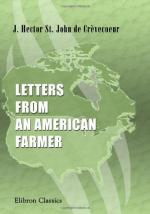Whilst all these different operations were performing, Andrew was absolutely incapable of working; it was to him the most solemn holiday he had ever seen; it would have been sacrilegious in him to have denied it with menial labour. Poor man, he sanctified it with joy and thanksgiving, and honest libations—he went from one to the other with the bottle in his hand, pressing everybody to drink, and drinking himself to show the example. He spent the whole day in smiling, laughing, and uttering monosyllables: his wife and son were there also, but as they could not understand the language, their pleasure must have been altogether that of the imagination. The powerful lord, the wealthy merchant, on seeing the superb mansion finished, never can feel half the joy and real happiness which was felt and enjoyed on that day by this honest Hebridean: though this new dwelling, erected in the midst of the woods, was nothing more than a square inclosure, composed of twenty-four large clumsy logs, let in at the ends. When the work was finished, the company made the woods resound with the noise of their three cheers, and the honest wishes they formed for Andrew’s prosperity. He could say nothing, but with thankful tears he shook hands with them all. Thus from the first day he had landed, Andrew marched towards this important event: this memorable day made the sun shine on that land on which he was to sow wheat and other grain. What swamp he had cleared lay before his door; the essence of future bread, milk, and meat, were scattered all round him. Soon after he hired a carpenter, who put on a roof and laid the floors; in a week more the house was properly plastered, and the chimney finished. He moved into it, and purchased two cows, which found plenty of food in the woods—his hogs had the same advantage. That very year, he and his son sowed three bushels of wheat, from which he reaped ninety-one and a half; for I had ordered him to keep an exact account of all he should raise. His first crop of other corn would have been as good, had it not been for the squirrels, which were enemies not to be dispersed by the broadsword. The fourth year I took an inventory of the wheat this man possessed, which I send you. Soon after, further settlements were made on that road, and Andrew, instead of being the last man towards the wilderness, found himself in a few years in the middle of a numerous society. He helped others as generously as others had helped




